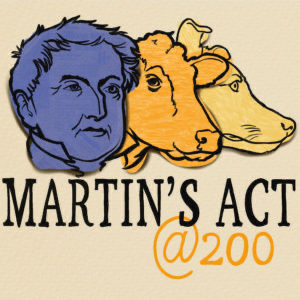Martin’s Act at 200
Bicentenaries don’t come around very often. And when they do, they’re unique opportunities to celebrate the past, acknowledge the present, and reach for the future. A significant animal rights bicentenary took place in 2022. Maybe you heard about it. But I fear many caring people, who should’ve learned about it, didn’t. Not every pro-animal organisation understood the bicentenary’s importance. Regardless of the movement’s philosophical spectrum and mission diversity, from hands-on rescue to political campaigns, we failed to take full advantage of the opportunity. There were, of course, notable exceptions that deserve recognition. They understood the benefits of working together for the animals and using a historic opportunity as a platform to do so.

Richard Martin MP
The bicentenary was the British Parliament passing the ‘Act to Prevent the Cruel and Improper Treatment of Cattle.’ It is usually known as ‘The Cruel Treatment of Cattle Act,’ and it was sponsored by the Irish politician Richard Martin (1754–1834), also known as ‘Humanity Dick.’ It was signed into law by King George IV on July 22, 1822. Martin’s Act, as the law was immediately called, is widely recognised as the first piece of animal welfare legislation passed by a modern representative body. The Martin’s Act bicentenary provided a wonderful opportunity to celebrate its passage, examine its legacy, and chart a course to passing even more laws protecting animals and recognising their rights. Two significant projects took this opportunity forward.
The UK Centre for Animal Law and the Universities Federation for Animal Welfare co-produced an outstanding international online conference called ‘Animalaw Visions for the Future.’ I was honoured to be included among the invited speakers.
The second project is the ‘Martin’s Act at 200‘, the excellent six-part audio documentary written and directed by Alex Lockwood and produced by the Culture & Animals Foundation. It includes 20 original interviews (including me), archival recordings, and re-enactments. It asks key questions: Did the commitment to animal welfare sideline or enable the argument for animal rights? How much has the animal movement achieved for animals? Does legislation drive change or react to it? And what lessons can be learned for the movement going forward?
 The Martin bicentenary may be over but the audio documentary is a component of chart2050, an effort to engage communities in thinking about what they would like to see accomplished for animals by the year 2050.
The Martin bicentenary may be over but the audio documentary is a component of chart2050, an effort to engage communities in thinking about what they would like to see accomplished for animals by the year 2050.
What do you think should be the next thirty years for animal rights? You may want systemic change or slight modifications of an existing order. You may wish to choose winnable victories or aim to overturn a long-entrenched injustice. You may be an idealist or an incrementalist. However you think about the future of political engagement, legislation, social change, or economic transformation, please visit chart2050 now to learn how you can chart the future for animals.











